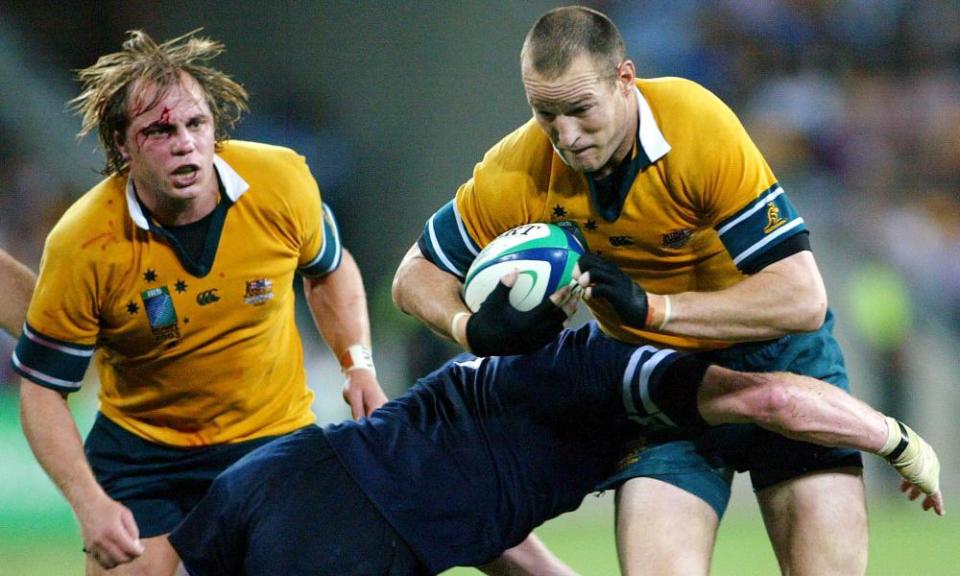USA Rugby announces steps towards World Cup bid, backed by MLR owners

USA Rugby will explore a bid to host the Rugby World Cup in 2027 or 2031, an effort backed by a “focused group of stakeholders” that includes interests from Major League Rugby, the US professional competition which completed two seasons before its third fell victim to Covid-19.
Related: Eddie Jones will spend time in US with San Diego Legion – England allowing
As well as the men’s event, generally considered the third-biggest global sporting event after the football World Cup and the Olympic Games, USA Rugby will consider bidding to host the women’s tournament in 2025 or 2029.
Ryan Patterson, a co-owner of the San Diego Legion in MLR, told the Guardian: “From work to date, we’d expect a Rugby World Cup in North America to be the most-attended, commercially successful in history, introducing millions of new players and fans to the game.”
He also said MLR interests were “excited to partner with USA Rugby” to bring the World Cup to “North America in 2027”.
USA Rugby has emerged from bankruptcy proceedings after, among other factors, the Rugby World Cup Sevens in San Francisco in 2018 produced a significant loss.
“While preliminary, a study of this nature will be very insightful and ensure appropriate due diligence is performed at every stage of the process,” USA Rugby chief executive Ross Young, formerly general manager for three men’s World Cups, said in a statement.
“This group of stakeholders have the best interest of the American game in mind and this report will offer the opportunity for more productive discussions with World Rugby at the beginning of next year, prior to any decision to continue the bid process.”
In a release, USA Rugby said the study would “focus on objective analysis, financial considerations, technical requirements and stakeholder support across the greater sports landscape. Similar to previous Rugby World Cup host unions, objective analysis will include legacy of the tournament and positive impact for the game of rugby in the United States.”
France will host the tournament in 2023. World Rugby has announced a single bidding process for the next two events, with a deadline in January 2022. Australia is favourite to host in 2027. Russia has announced a bid backed by Vladimir Putin.
The bidding process will include a “dialogue phase”, in February 2021, which USA Rugby described as “an opportunity for open communication between World Rugby, unions, governments and other key stakeholders in order to understand the business and delivery model, how each will partner with World Rugby and ultimately build a compelling bid proposal”.
The US will host the 2026 football World Cup, with Canada and Mexico, and the Olympic Games in Los Angeles in 2028. As World Rugby looks to repeat the success of Japan 2019, a tournament held in a tier-two rugby nation, many observers see the US as a possible host for 2031.
Many also see it as an untapped market crucial for success in a post-pandemic world. But in the American game, the last two years have been tempestuous.
MLR ended its third season after just five rounds, thanks to the coronavirus pandemic and amid rumours of financial problems. The Colorado Raptors, a foundation team, have withdrawn. A project in Hawaii backed by a group of ex-All Blacks will not play in 2021 as planned. Missing a payment deadline, the Hawaii operation questioned the league’s financial health and ability to survive Covid-19.
Nonetheless, MLR interests have formed Rugby Growth Investments (RGI), which according to a foundational document obtained by the Guardian is seeking investors as it looks to “access, influence and accelerate” North American rugby, with the aim of hosting the World Cup by 2031.
Touting “globally connected, well-capitalised, active rugby investors and advisers”, the document lists Stirling Mortlock, a back who captained Australia and played 80 Tests from 2000 to 2009, as a source for further information.

Mortlock did not reply to an email seeking comment but Patterson said: “San Diego Legion and other MLR owners created Rugby Growth Investments to fund opportunities at all levels of the North American rugby ecosystem. Partnering with USA Rugby to finance a RWC bid for 2027 would be transformational event that would fast-track game-wide growth.”
The RGI document identifies challenges which face anyone looking to invest in US rugby, where specialised facilities are few and crowds and TV audiences low in world terms.
Related: Hawaii team backed by ex-All Blacks will not play MLR in 2021, league says
“North American Rugby is highly fragmented,” it says. “It lacks an effective and sustainable rugby ecosystem. It needs capital, expertise, centralised platforms and opportunities for competition.”
RGI says it can be “a strategic capital partner” for MLR, USA Rugby and World Rugby, in order to “fast-track community, commercial & high-performance systems in preparation for a RWC” in “North America [in] 2027 or 2031”.
The document also says RGI aims to “drive value in MLR” and “build a ‘World Cup ready’ rugby ecosystem”.
Patterson said: “Other RGI investments in Major League Rugby and central platforms and services aim to connect the rugby community, engage fans and develop youth pathways, club and collegiate players and aspiring coaches.”
Jim Brown, a member of the USA Rugby board who has advised major events including Olympic Games and football World Cups, will steer the feasibility study.
In a statement to the Guardian, he said: “There are a number of involved stakeholders with vested interest in the domestic game, which includes parties within MLR.
“The opportunity of hosting the biggest event in our sport and all it brings with it would of course be a driving force for the league, so their active participation and support during the preliminary stages is crucial.”

 Yahoo Sport
Yahoo Sport 





































